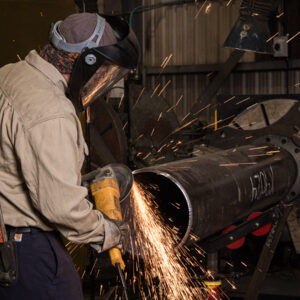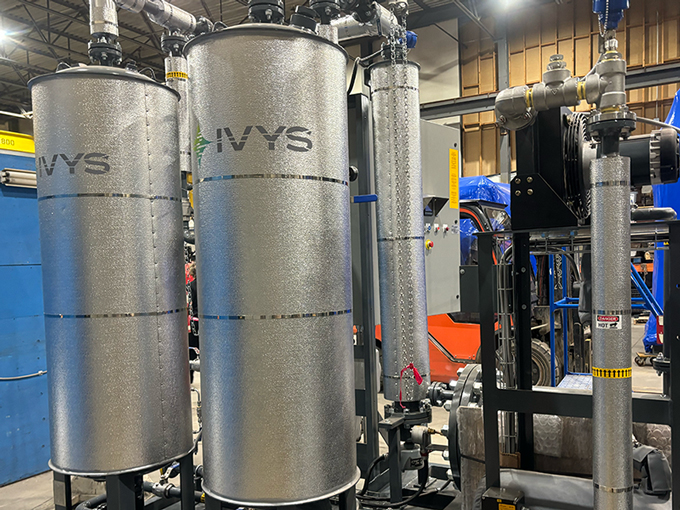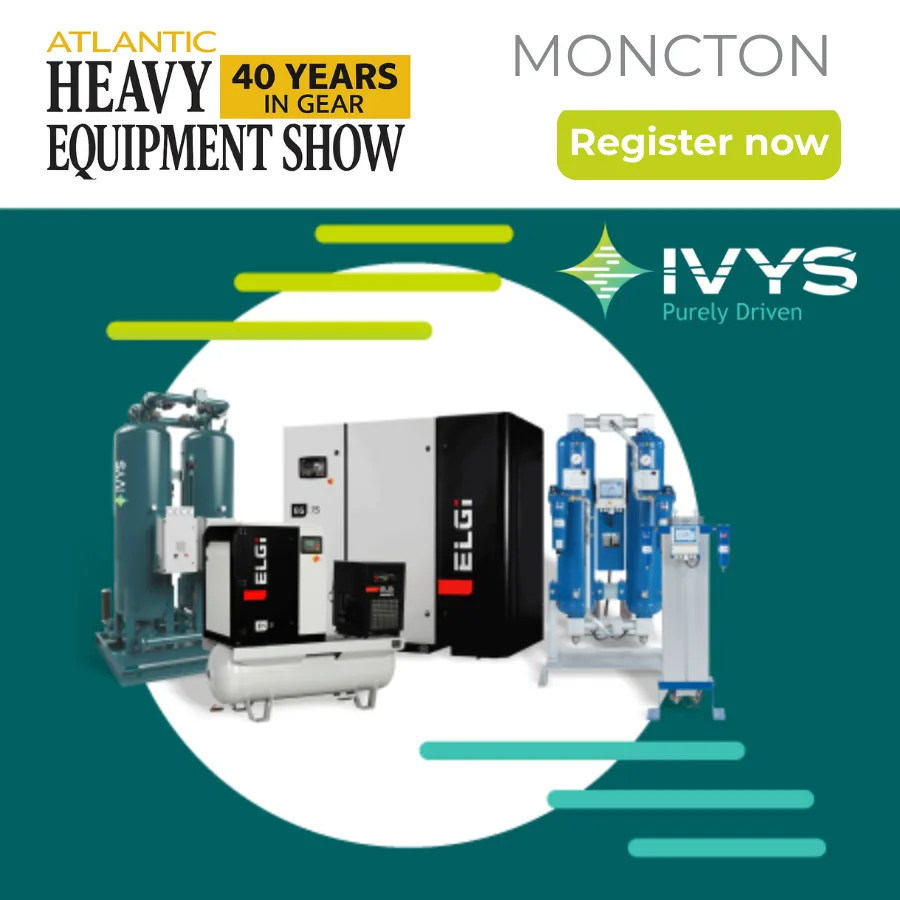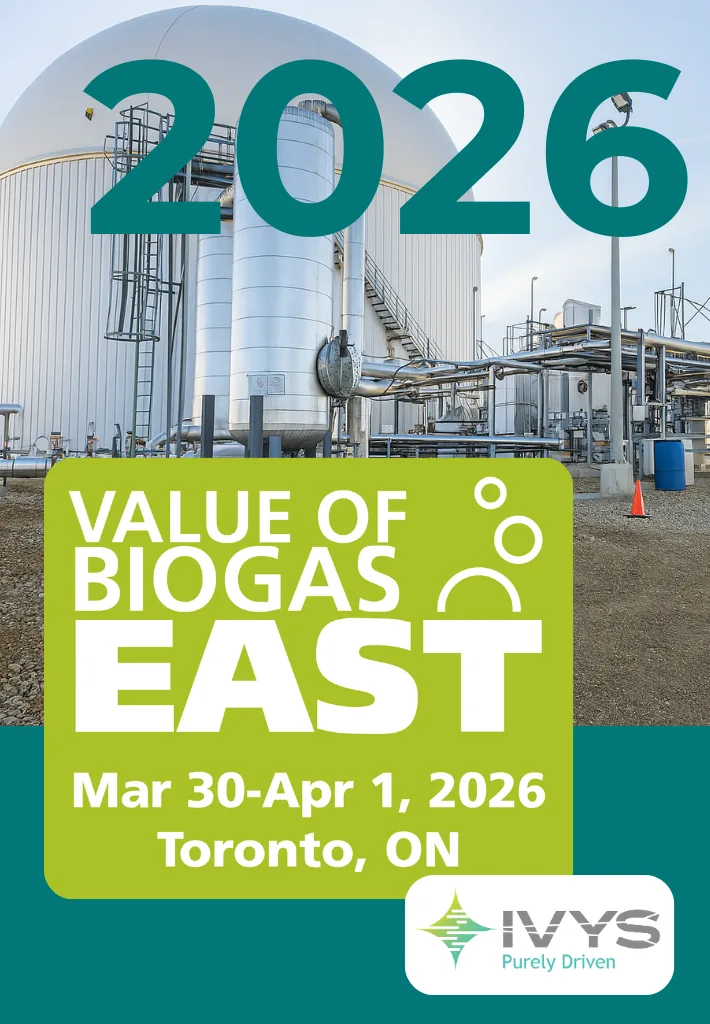ASME U – UM – R stamps – PED certification – assuring the quality and safety of our pressure vessels
Our fast-cycle pressure swing adsorption (PSA) systems, gas dryers, and Biostream all require pressure vessels as part of their design and manufacturing. These vessels will contain renewable natural gas (RNG), hydrogen, helium, carbon dioxide, or some other gas. They operate under high pressure and in various weather and temperature conditions. Ivys employs a comprehensive, rigorous, and internationally recognized set of standards for which we are certified, including ASME “U” and “UM,” NBBI “R,” and PED.
Our certifications
The ASME “U” and “UM” stamps are certification marks provided by the American Society of Mechanical Engineers (ASME). Both are part of the ASME Boiler and Pressure Vessel Code (BPVC), specifically under Section VIII, which governs pressure vessel design, manufacture, and inspection.
- “U” Stamp: Applies to larger pressure vessels that comply with ASME BPVC, Section VIII, Division 1.
- “UM” Stamp: Applies to smaller pressure vessels that fall under specific size and pressure limits as outlined in Section VIII, Division 1.
The “R” Certificate is provided by the National Board of Boiler and Pressure Vessel Inspectors (NBBI). It authorizes Ivys to use the “R” symbol stamp to repair and/or alter pressure-retaining items.
The European Pressure Equipment Directive 2014/68/EU (PED) focuses on ensuring that the design and manufacturing of stationary pressure equipment that exceeds a maximum pressure of 0.5 bar is carried out safely. The PED guarantees that such equipment meets crucial safety standards, adheres to conformity assessment procedures, and proudly displays the CE marking and the necessary information.
These stamps are crucial certification marks that guarantee our pressure vessels are designed, manufactured, and inspected according to the highest safety and quality standards. They are a testament to our commitment to excellence and provide confidence that our PSA equipment for purifying RNG, hydrogen, and other gases will perform safely and reliably.
In order to maintain certification, Ivys went through a comprehensive inspection and provided a thorough document of the design, fabrication, testing, and certification processes to the ASME certification board. Additionally, detailed documentation of design calculations, material certifications, welding procedures, non-destructive testing, including X-ray and UT-MT tests, and hydrostatic testing results were shared with the inspectors. A similar process is used for the “R” stamp and PED certification.
5 reasons why is having this certification is important
Safety Assurance
“U” and “UM”, “R” stamps, and PED certificates signify that the pressure vessels have undergone rigorous design, fabrication, and testing processes in compliance with strict safety standards. Pressure vessels function under hazardous conditions such as high pressure, high temperature, and handling of hazardous materials, and any malfunction could lead to severe outcomes like explosions or leaks. The ASME and other certifications play a crucial role in minimizing these risks.
Regulatory Compliance
It is important to note that in many jurisdictions, such as provinces, states, and countries, ASME certification for pressure vessels is required to ensure public safety. Without a “U” or “UM” stamp, it may be illegal to operate or install pressure vessels in these areas. By obtaining an ASME-certified vessel, companies can comply with legal and safety regulations. Operating non-certified pressure vessels in industries like oil and gas, chemical processing, and power generation could lead to fines, shutdowns, or even lawsuits in case of accidents. In the EU, the PED certification serves the same function.

Global Recognition
The ASME and PED standards enjoy global recognition, and the “U” and “UM” stamps offer international credibility. This is especially valuable for businesses with global operations or exporting products, as the ASME certification is widely accepted in many countries as evidence of safety and dependability. The PED is required by law in the EU.
Quality Assurance
These stamps indicate that the vessel has successfully undergone a comprehensive quality control process, which includes meticulous material selection, design verification, welding procedures, and pressure testing. This provides assurance to companies and end-users that Ivys’s equipment will perform as expected and will have a long operational lifespan.

Insurance and Liability
It’s important to keep in mind that insurance companies often require ASME certification for coverage. The presence of a “U” or “UM” stamp on a pressure vessel ensures that it meets the necessary safety criteria, reducing the risk of operational failures and accidents. This can also lead to lower insurance premiums. In the unfortunate event of an accident, having ASME-certified equipment can shield companies from liability, as they can demonstrate that they followed the highest industry standards. Without this certification, a company may face legal challenges if it is found to have used uncertified or substandard equipment.
At Ivys, we are proud to design and manufacture equipment that meets the safety and quality assurance standards of the ASME “U,” “UM,” and “R” certifications and the PED accreditation. This includes our fast-cycle PSA, which provides a significant footprint and cost advantages compared to conventional PSA technologies. To achieve these high lifecycles, we manufacture our pressure vessels with the highest quality and safety standards.
Maintaining these certifications requires the cooperation of Ivys’s dedicated engineers, manufacturing team, quality assurance, and documentation specialists.










